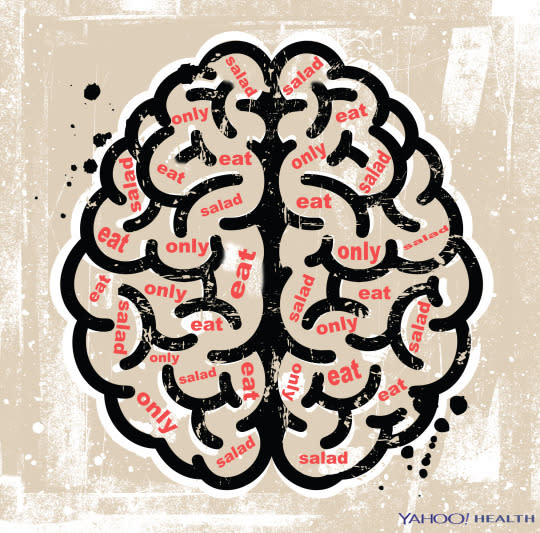Is Everything We Know About Treating Anorexia Wrong?

A new study suggests that anorexia might not be about control at all, but habits the brain can’t seem to let go. (Nadeen Nakib for Yahoo Health/Getty Images)
Most of us have an idea in our heads about what anorexia nervosa is. It’s all about control. Controlling what to eat, when to eat, and frequently if to eat at all. However, a new study published in Nature Neuroscience suggests much of what thought we know about anorexia is wrong.
The study gives us a glimpse at the how the brain tackles decision-making in those with anorexia nervosa. Instead of being the result of extreme control over food intake, anorexia may be deeply ingrained habit.
And, as most of us know, habits are extremely hard to break.
“This project is exciting because it allowed us to use brain imaging to directly examine neural activity related to a very important symptom of anorexia nervosa: restrictive intake,” study author Joanna Steinglass, MD, an associate professor of clinical psychiatry at the Columbia Center for Eating Disorders tells Yahoo Health. “The Columbia Center for Eating Disorders has long been interested in why patients with anorexia nervosa get so ‘stuck,’ and The Learning Laboratory at Columbia has long studied how individuals make choices.”
Related: Woman with Severe Anorexia Raises Nearly $200,000 for Treatment
Working with 21 women with anorexia and a control group of 21 healthy women, the researchers used a functional MRI to look at brain activity while they made decisions about what foods to eat.
As expected, the study found that the anorexic women were more likely than the healthy women to choose low-fat, low-calorie food. In both the healthy controls and the individuals with anorexia, the researchers saw activity in a part of the brain’s reward center: the ventral striatum.
However, there was a key difference in the brain activity of those with anorexia: there was activity in the brain’s dorsal striatum. This is an area of this brain that deals with habitual behavior (like motor functions), suggesting those with the disorder default to old habits when selecting foods instead of actually weighing a decision about what to eat.
Related: 9 Facts About Eating Disorders That May Surprise You
This may be a big reason the eating disorder is so difficult to treat — because the mechanism by which anorexia takes hold is so ingrained – and that’s what makes the study important, says Steinglass. “This project allows us to focus on the actual behavior that is so dangerous for patients, and to test theories about how maladaptive behavior becomes resistant to change,” she explains.
According to Jennifer Carter, PhD, Director of Sports Psychology at The Ohio State University Wexner Medical Center and an eating-disorder specialist, a better understanding of the neurobiology of eating disorders is currently helping to direct treatment.
Carter says this new piece of research should help add to the growing body of literature on the condition and how best to treat it. Right now, she says that often includes a combination of psychotherapy, nutritional counseling and various types of medical management.
Related: 7 Things You Shouldn’t Say To Someone Who’s Had An Eating Disorder
“The best medication for anorexia nervosa is food, but eating also creates high anxiety,” she says. “If the eating-disorder behaviors are severe and well-established, individuals often need a higher level of care to support them in establishing normal eating and restoring weight.”
According to Carter, more advanced care might include inpatient or residential treatment, intensive outpatient therapy, or partial hospitalization — but hopefully with more neurological research like the current study, medical professionals will be able to help those with developing anorexia earlier and treat the condition more effectively.
Anorexia Nervosa is notoriously hard to treat, resulting in one of the highest mortality rates of any mental illness. Although research is ongoing, studies haven’t clearly illustrated the exact brain mechanisms behind anorexia. So even though doctors and specialists know the symptoms, there’s no guarantee treatment will be effective long-term.
Let’s keep in touch! Follow Yahoo Health on Facebook, Twitter, Instagram, and Pinterest. Have a personal health story to share? We want to hear it. Tell us at YHTrueStories@yahoo.com.
